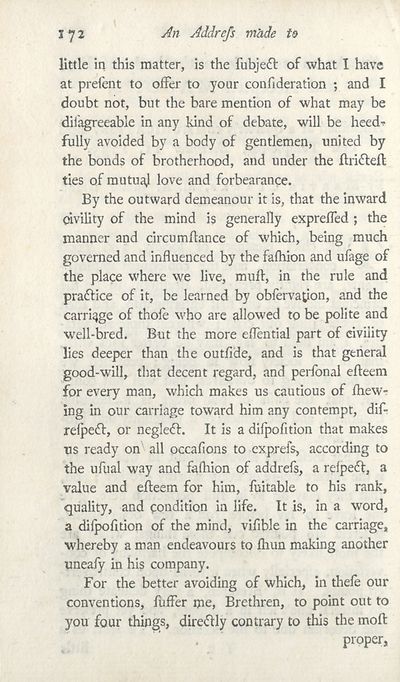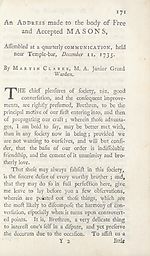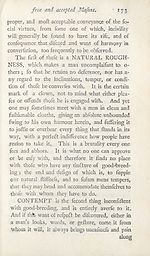Download files
Complete book:
Individual page:
Thumbnail gallery: Grid view | List view

172
An Addrefs m'ade U
little in this matter, is the fubjett of what I have
at prefent to offer to your confideration ; and I
doubt not, but the bare mention of what may be
diiagreeable in any kind of debate, will be heed^
fully avoided by a body of gentlemen, united by
the bonds of brotherhood, and under the ftrifteft
ties of mutual love and forbearance.
By the outward demeanour it is, that the inward
civility of the mind is generally exprefled ; the
manner and circumftance of which, being much
governed and influenced by the fafhion and ufage of
the place where we live, muff, in the rule and
pradfice of it, be learned by obfervatfon, and the
carriage of thofe who are allowed to be polite and
well-bred. But the more effential part of civility
lies deeper than the outfide, and is that general
good-will, that decent regard, and perfonal efteem
for every man, which makes us cautious of fhew-
ing in our carriage toward him any contempt, dif-
refpedl, or negledl. It is a difpofition that makes
ns ready on all occafions to exprefs, according to
the ufual way and fafhion of addrefs, a refpedl, a
value and effeem for him, fuitable to his rank,
quality, and condition in life. It is, in a word,
a difpofition of the mind, viflble in the carriage,
whereby a man endeavours to fhun making another
uneafy in his company.
For the better avoiding of which, in thefe our
conventions, fuffer me, Brethren, to point out to
you four things, directly contrary to this the moft
proper,
An Addrefs m'ade U
little in this matter, is the fubjett of what I have
at prefent to offer to your confideration ; and I
doubt not, but the bare mention of what may be
diiagreeable in any kind of debate, will be heed^
fully avoided by a body of gentlemen, united by
the bonds of brotherhood, and under the ftrifteft
ties of mutual love and forbearance.
By the outward demeanour it is, that the inward
civility of the mind is generally exprefled ; the
manner and circumftance of which, being much
governed and influenced by the fafhion and ufage of
the place where we live, muff, in the rule and
pradfice of it, be learned by obfervatfon, and the
carriage of thofe who are allowed to be polite and
well-bred. But the more effential part of civility
lies deeper than the outfide, and is that general
good-will, that decent regard, and perfonal efteem
for every man, which makes us cautious of fhew-
ing in our carriage toward him any contempt, dif-
refpedl, or negledl. It is a difpofition that makes
ns ready on all occafions to exprefs, according to
the ufual way and fafhion of addrefs, a refpedl, a
value and effeem for him, fuitable to his rank,
quality, and condition in life. It is, in a word,
a difpofition of the mind, viflble in the carriage,
whereby a man endeavours to fhun making another
uneafy in his company.
For the better avoiding of which, in thefe our
conventions, fuffer me, Brethren, to point out to
you four things, directly contrary to this the moft
proper,
Set display mode to:
![]() Universal Viewer |
Universal Viewer | ![]() Mirador |
Large image | Transcription
Mirador |
Large image | Transcription
| Antiquarian books of Scotland > Freemasonry > Free-masons pocket-companion > (182) |
|---|
| Permanent URL | https://digital.nls.uk/123600315 |
|---|
| Description | Thousands of printed books from the Antiquarian Books of Scotland collection which dates from 1641 to the 1980s. The collection consists of 14,800 books which were published in Scotland or have a Scottish connection, e.g. through the author, printer or owner. Subjects covered include sport, education, diseases, adventure, occupations, Jacobites, politics and religion. Among the 29 languages represented are English, Gaelic, Italian, French, Russian and Swedish. |
|---|

